2024
CfHAS Postgraduate Research Symposium Thursday May 30th – Friday May 31st. Registration page is here
Programme:
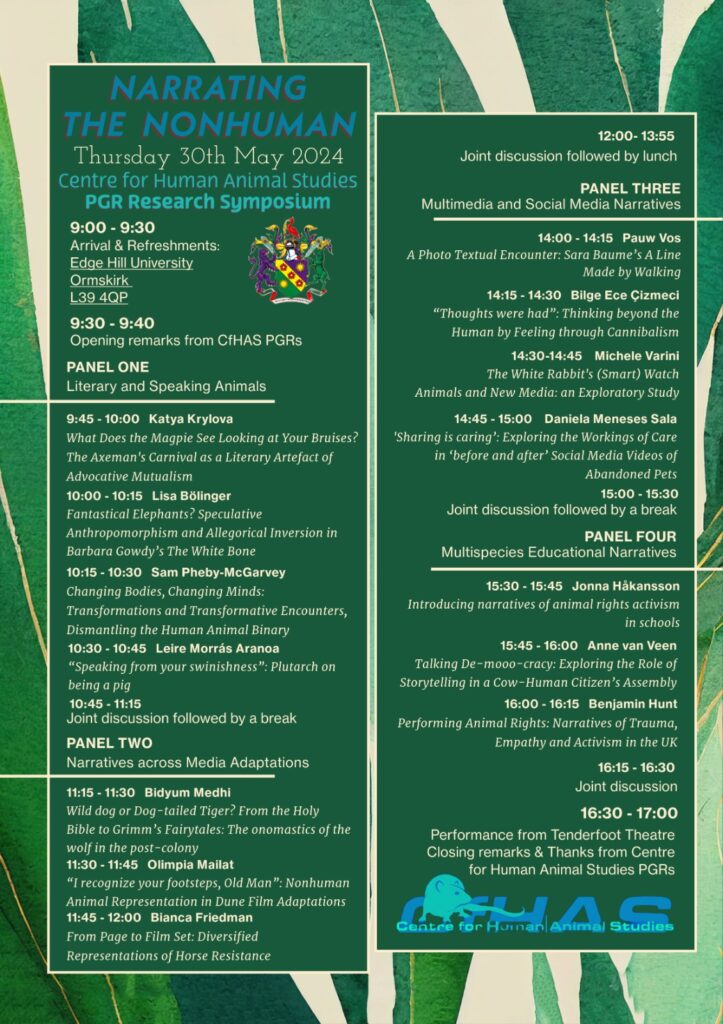
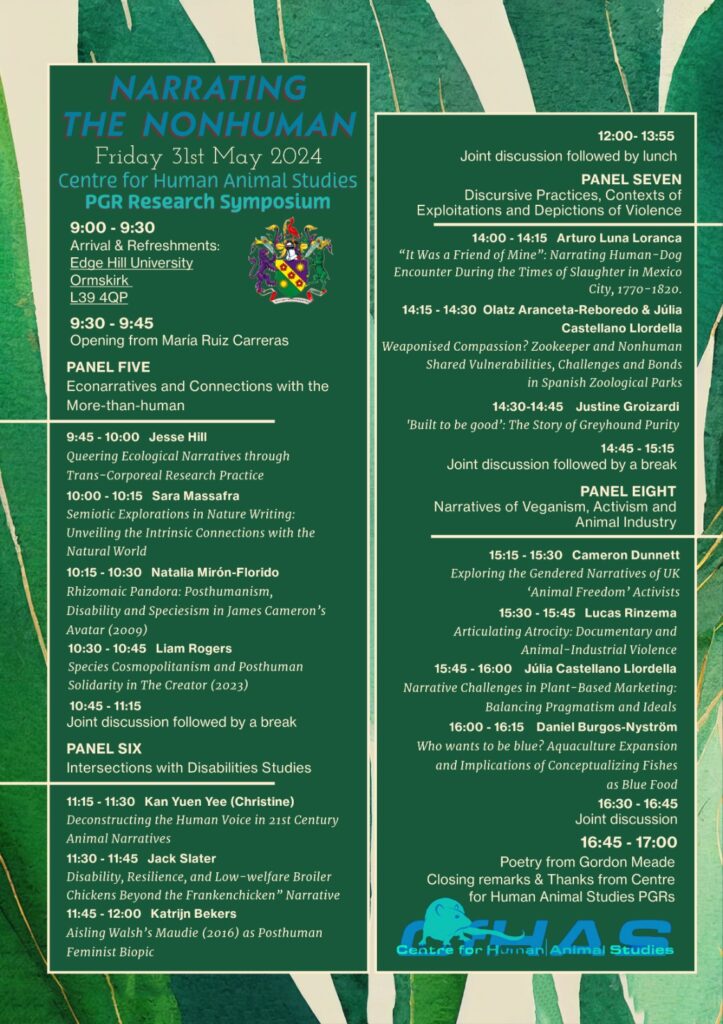
2023
Seminar 5
“Bad Dog? Multispecies Justice in Pit Bull Politics’ (Dr Harlan Weaver, Kansas State University, USA) – Thursday 14th December 2023 1600-1730 BST.
Register for the talk here
Abstract:
Focused through the lens of “interspecies intersectionality,” this talk engages with pit bulls and bully breed dogs in exploring how relationships between humans and non-human animals shape and are shaped by experiences of gender, race, colonialism, class, nation, sexuality, species, and breed. Traversing themes ranging from the history of the “human” to the politics of animal rescue, I join ethnographic work with cultural studies in an examination of how dogs like staffies and XL bullies are and have been targeted through practices like breed-specific legislation. By taking up this targeting in conjunction with the ways that pit bulls have been increasingly disconnected from Black and brown working-class masculinities in the U.S., I think towards the practices necessary to not just a multispecies justice, but a multispecies reparations.
Seminar 4
‘‘Save Cow, Save India’: Bovine-human vulnerabilities in India’s cow protection politics’ (Dr Yamini Narayanan, Deakin University, Australia) – Thursday 19th October 2023 1600-1730 BST.
Abstract:
India criminalises cow slaughter, based on Hindus’ reverence of cows as sacred, and a Hindu ultranationalist or Hindutva politics seeks to reconceptualise, or more accurately in their worldview, restore India as a Hindu state, through their imagination of the cow as a Hindu nation. Simultaneously, it was under the ruling Hindu nationalist party BJP that India also became one of the largest global producers of beef. This talk addresses this puzzle by demonstrating how the cow-worshipping, beef-criminalising, aspirational Hindu state obscures the role of dairying in enabling an industrial scale of underground cow slaughter in India. Specifically, it highlights the illicit transportation of unwanted dairy cows to slaughterhouses as a key terrain of Hindutva politics, exploiting the clashing vulnerabilities of the racialized/Hinduised cows used as economic and political capital, and of ‘low’ caste Dalits and Muslims performing the risky, racialized labour of slaughtering cows. Seeking to overcome the anthropocentrism of the people vs. animals impasse that characterises most political debate, I conclude with some thoughts on a post-dairy society, based on an anti-caste, anti-anthropocentric, anti-Hindutva resistance.
Seminar 3
‘Sustainability: A dirty word for animal advocates? – The many ways in which animals are abandoned in sustainability discourses’ (Dr Iris Bergmann, Independent Scholar) – Thursday 21st September 2023 1000-1130 BST.
Abstract:
I begin this presentation by exploring how the discourse in the intersection of sustainability and animal protection has evolved in the past five years. I provide a snapshot of how the literature in the field of sustainability considers the animal question, how the animal science and welfare literature addresses the sustainability question, and how the animal studies literature engages with the notion of sustainability. The majority of studies seeking to advance the animal perspective within the latter realm are situated within the animal food consumption and production sector. Others focus on sustainable development and in particular the Sustainable Development Goals, whereas again others embed their work in critical and holistic perspectives of sustainability theory. Overall, progress seems slow, and consequently, animal interests remain underrepresented in recent sustainability programs and policy related documents. Moreover, particular groups of animal advocates see the idea of sustainability as anathema to animal protection and welfare. I will demonstrate this by introducing a few examples of sustainability programs and policy related documents, and by presenting some of the results of my earlier study looking at sustainability conceptualisations of animal advocates. I will conclude this presentation with suggestion for ways of progressing the discourse, and a note of caution.
Iris would welcome a discussion on the following question: In light of slow progress and the cautionary note, should we continue to expend efforts in advancing the sustainability discourse for animal interests? In other words, why hang on to the notion of sustainability when seeking to advance the interests of animals?
____
Our postgraduate symposium took place in June:
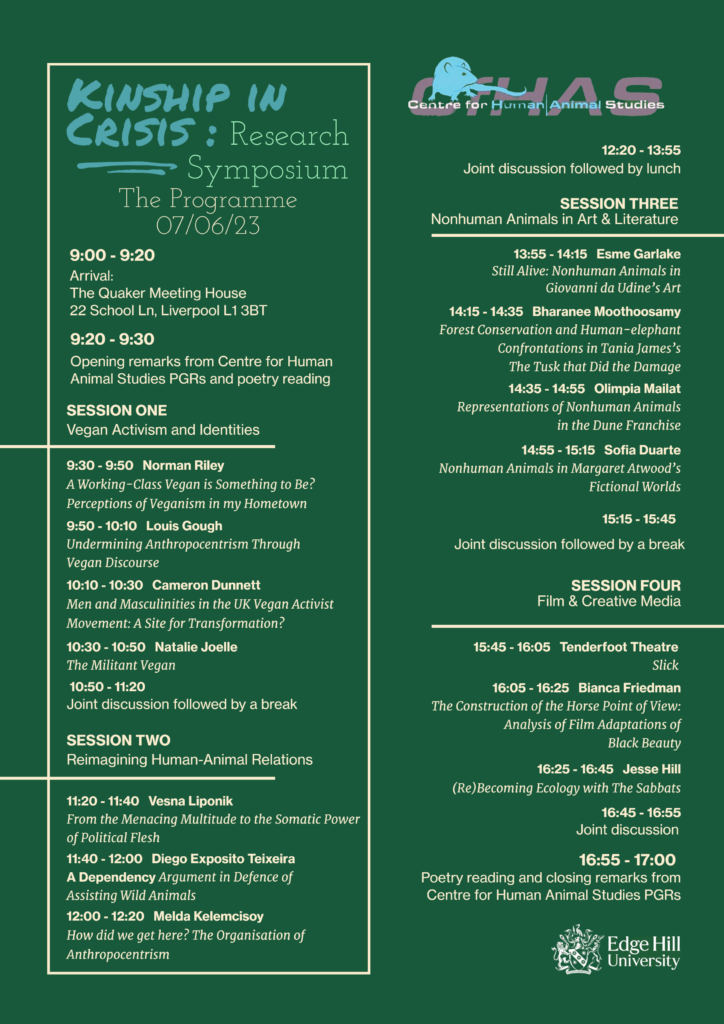
Seminar 2
‘A Confrontation with Fixed Capital: Lessons from Marx’s Value Theory on Animal Agriculture’ (Dr Dinesh Wadiwel, Associate Professor in human rights and socio-legal studies, University of Sydney, Australia) – Thursday 8th June 2023 1000-1130 BST.
Abstract:
There has been a growing scholarship on animal labour, which has highlighted the role of non-human animals within systems of production and explored the implications of this framing for rights and welfare. In this talk, drawing from my forthcoming book Animals and Capital (Edinburgh UP 2023), I will explore how Karl Marx’s value theory might help to make sense of the position of animals as labour within food systems. I will argue that applying Marx’s approach to understanding animals as labour assists us to makes sense of how animals might have been positioned by capitalism as sources of surplus, and the unique strategies deployed by capital to maximise efficiencies through intensification. I will also argue that this approach allows us to view the factory farm in a new light. This nightmare of capitalist agriculture is not so much about ‘human animal relations’ but instead represents an antagonistic confrontation between animals and ‘fixed capital’; that is enclosures, machines and technologies designed to tie down, subordinate and extract value from animal bodies.
Seminar 1
‘Building Dogopolis: Dogs and Humans in Modern London, New York and Paris’ (Professor Chris Pearson, Department of History, University of Liverpool, UK) – Thursday 18th May 2023 1500-1630 BST.
POSTPONED UNTIL FURTHER NOTICE
Abstract for the talk:
Chris Pearson will explore the integration of dogs into the urban landscapes of London, New York, and Paris between c.1800 and 1939. The paper will outline how canine straying, biting, suffering, thinking, and defecating were transformed across these cities. The result was dogopolis, the somewhat shaky agreement that arose between the middle classes of London, New York and Paris on how urban dogs should cohabit cities with humans in a civilized, healthy, and safe way. Dogs were eventually integrated into city life in line with middle class emotional values that centred on revulsion at dirt, fears of vagabondage, anxieties about crime and the promotion of humanitarian sentiments. Dogopolis was created by, and helped to create, Western urban modernity: the emotionally-charged transnational attempts to harness, constrain or eliminate canine straying, biting, suffering, thinking, and defecating became part of the making of Western modern cities.
********
We’re delighted to announce our 2023 seminar series. To register for each seminar please check back here about 4 weeks in advance of each seminar.
Please see all the details below
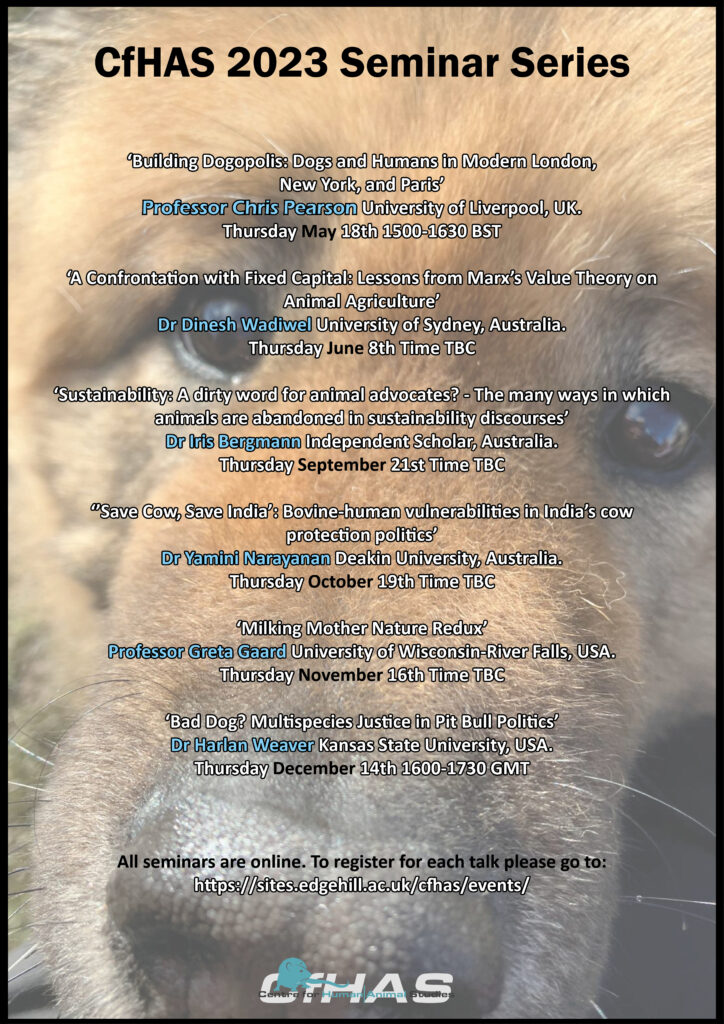
Our Postgraduate researchers are organising a symposium to take place in Liverpool in June.
Please see all the detailes below
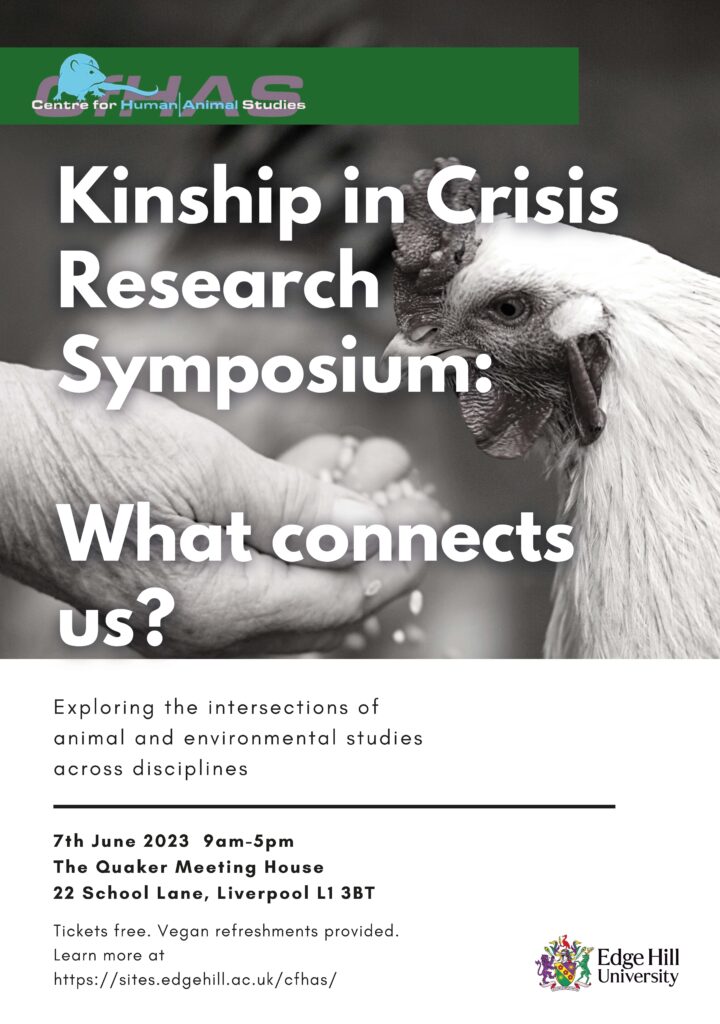
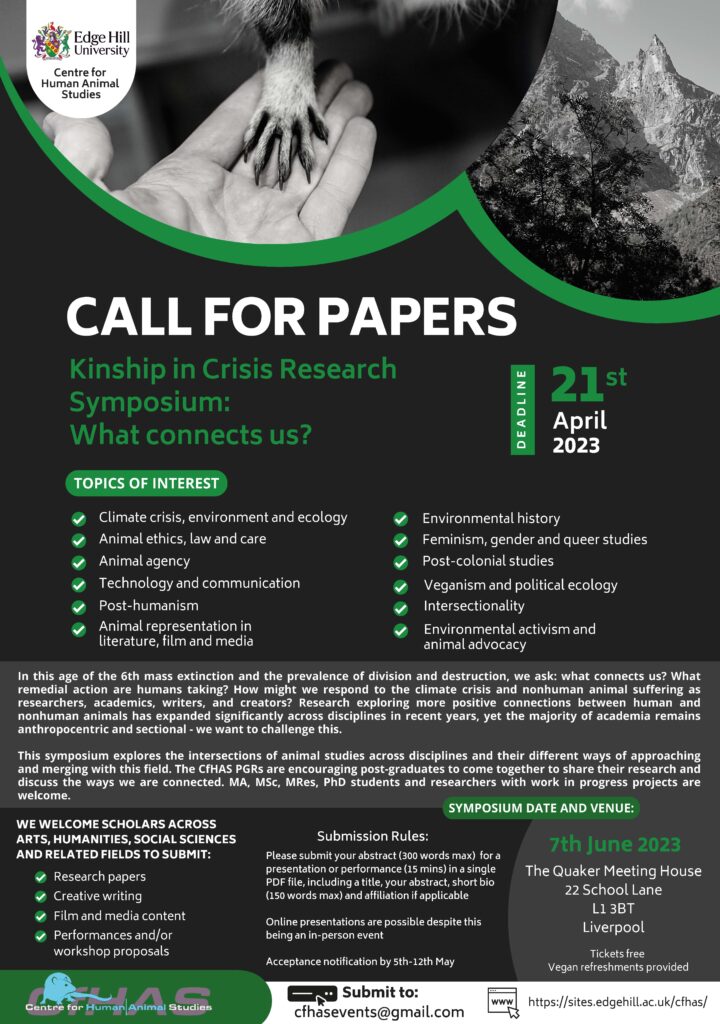
2022
Animals and Landscapes symposium 17th-18th November 2022
Location: Hilton Hotel and Walker Art Gallery, Liverpool, UK
Polar bears on melting ice caps have come to embody the impacts of climate change on the Arctic landscape; grazing cows are an established part of the iconography of supposedly-bucolic rural spaces; the wolf and wolf howl are culturally emblematic of wilderness. Animals also materially shape and remake landscapes through their individual and everyday species-specific practices, acknowledgement of which recognises their agency in the production of spaces. At the same time, the relationship between the symbolic and the material can reveal much about the colonisation of spaces, and the anthropocentric exploitation of landscapes and the animals who inhabit them.
This event invites participants to consider the complex relationships between animals and landscapes, where ‘landscapes’ is understood in a broad, inclusive manner. It is particularly interested in exploring how animals shape landscapes in both material and symbolic senses, and how multispecies approaches can be used to critically reconsider landscape aesthetics, animal agency, and spaces of co-production.
We welcome papers, poster presentations, and creative responses from scholars across arts, humanities and social science disciplines that address the broad theme of animal landscapes.
Indicative topics include:
- Animal landscapes in art, media, film, radio, literature
- Presence and/or absence in extinction and/or climate change discourses and narratives
- Movement in, across and/or through landscape
- Animal agency and landscape use
- Farmed landscapes and/or the animal industrial complex
- Idealised landscapes
- Landscapes/soundscapes
Deadline for submissions: 16 October 2022
This event is funded by UKRI AHRC as part of the Multispecies Storytelling project. The project will cover travel and accommodation within the UK for participants.
Email 250 word abstracts to: [email protected]
Seminar 6 Update! This seminar has had to be postponed until 2023. To register for our final seminar of 2022: ”Save Cow, Save India’: Bovine-human vulnerabilities in India’s cow protection politics’ (Dr. Yamini Narayanan, Deakin University, Australia) Thursday November 24th 2022 – 0900-1030 GMT (2000-2130 Geelong, AUS)
Previous events:
Seminar 5 ‘Wildlife trade, harms, victimization and law enforcement?’ (Professor Ragnhild Sollund, University of Oslo, Norway) – Thursday 20th October 2022 1500-1630 BST.
Abstract for the talk:
Wildlife trade is both a conservation issue and an issue of species injustice and animal abuse. Freeborn animals are killed and/or trafficked cross the globe to be exploited as products, whether as fashion, food, medicinal products, and trophies or alive to be part of private collections, used in the tourist industry or as “pets”. Whether or not they are trafficked legally or illegally, they suffer from harms of the trade, through being killed, abducted from their natural habitats, encaged and enslaved. In this talk, I focus on WLT in Norway, its features and the ways in which this evil is enforced in this country. I have collected data from law enforcement agencies in Norway, starting in 2020, and with follow up data collection in 2020, in relation to the CRIMEANTHROP project [Criminal Justice, Wildlife Conservation and Animal Rights in the Anthropocene CRIMEANTHROP – Department of Criminology and Sociology of Law (uio.no)].
Seminar 4 ‘Searching for an animal standpoint in education: Insights from the field and new research initiatives’ (Dr. Helena Pedersen, University of Gothenburg, Sweden) – Thursday 29th September 2022 1500-1630 BST.
Abstract for the talk:
After 20 years of critical animal studies, what is the current position of animals in education practice and theory? This question is not solely an issue of intra-disciplinary interest, but a pressing concern for society at large, since formal education affects all sectors of society and is a major part of most people’s lives, from kindergarten level to adult age. In this talk I will bring out some insights regarding the (problematic) position of animals in education by zooming in on two recent research articles in early childhood education and teacher education, respectively. I will ask whether an ’animal standpoint’ (Kahn, 2011) at all exists in education research, and highlight some emerging animal advocacy scholarship that brings hope to animals and points out ways forward for critical animal pedagogies.
Seminar 3 ‘Animal grief: emotions and conceptualisations, an overview’ (Dr. Teya Brooks Pribac, Australia) – Thursday 9th June 2022 1000-1130 BST.
Abstract for the talk:
Grief is essentially an organismic reaction to loss. At this level the emotion is comparable across species, and differences will manifest on an individual not species level. Grief, as a response to loss, is rooted in the intrinsically relational nature that is characteristic of animals. The reason humans can experience grief is because we are animals, not despite the fact that we are animals.
Most humans recognise that other animals have the capacity to experience grief when they lose a close person. However, without an adequate understanding of the role and power of attachment relations, the potential intensity of grief, following a loss, in other animals can be undervalued. It can also be further obscured by uncritically introducing into the equation satellite questions of a more interpretative, conceptual nature (e.g. do other animals understand mortality? do they view death the way we do? etc.), or by relying too heavily on behavioural cues, and related assumptions.
This presentation will begin by discussing some of these issues and assumptions, then move on to examine more closely the function and potency of attachment relations and how that may aid our insight into grief.
Seminar 2 ‘Why climate crisis rhetoric is not helping animal advocacy’ (Professor Nuria Almiron, Universitat Pompeu Fabra, Barcelona, Spain) – Thursday 7th April 2022 1500-1630 BST.
Abstract for the talk:
This talk will explore whether animal advocacy is losing momentum and strength by using, focusing or merging with the climate crisis action and rhetoric. The climate focus, it will be argued, is not only failing to speed up animal liberation but may be actually disempowering the animal defence movement. To support this view, the author will draw on three main resources: First, results from a research project she coordinated for almost five years about climate change denial and obstructionism; Second, updated thoughts on an examination conducted regarding the effectivity of the environmental frame for animal defence; Third, her current investigation on what triggers compassion, a moral emotion essential for taking action. One of the main concerns addressed by the talk will be the fact that climate action rhetoric has become mainstream empty speech in current tecno-financialised capitalism, which leads to solutions that may just backfire on sentient animal interests.
Seminar 1 ‘Pavlov and the kingdom of dogs: telling different human-animal stories’ (Dr. Matthew Adams, University of Brighton, England) – Wednesday February 23rd 2022 1600-1730 GMT.
Abstract for the talk:
The growth of Human-Animal Studies and critical variations, multi-species and posthuman scholarship reflects an ‘animal turn’ offering important theoretical, ethical and methodological challenges to humanities, science and social science disciplines, though psychology, in particular, has been slow to engage with these developments. This talk applies the conceptual lens of the ‘animal turn’ to physiologist-cum-psychologist Ivan Pavlov’s (1849-1936) ‘classical conditioning’ experiments with dogs. Pavlov and his co-workers conducted experiments with thousands of dogs in his St Petersburg laboratory complex (which one visitor referred to as the ‘kingdom of dogs’) over a fifty-plus year career. The presentation will draw on historical and biographical sources to create a portrait of the lives of these dogs. Inspired by the work of Donna Haraway, Vivienne Despret and others, it will highlight the various, shifting dimensions of the human-nonhuman animal entanglements at the core of a fascinating experimental assemblage – incorporating bodies and bodily fluids, technologies, relationships, propaganda and secrets, against a backdrop of enormous social, political and scientific upheaval. This portrait is contrasted with contemporary retellings of Pavlov’s experiments which ignore or are indifferent to the complexities of that relationship. Paying attention to nonhuman others that constitute animal experimentation in psychology, historically, today, and in retellings, is argued to be an important step, not least for psychology itself. It prompts a radical shift in the way it might approach the lives of nonhuman animals, more in keeping with promising developments in other disciplines.
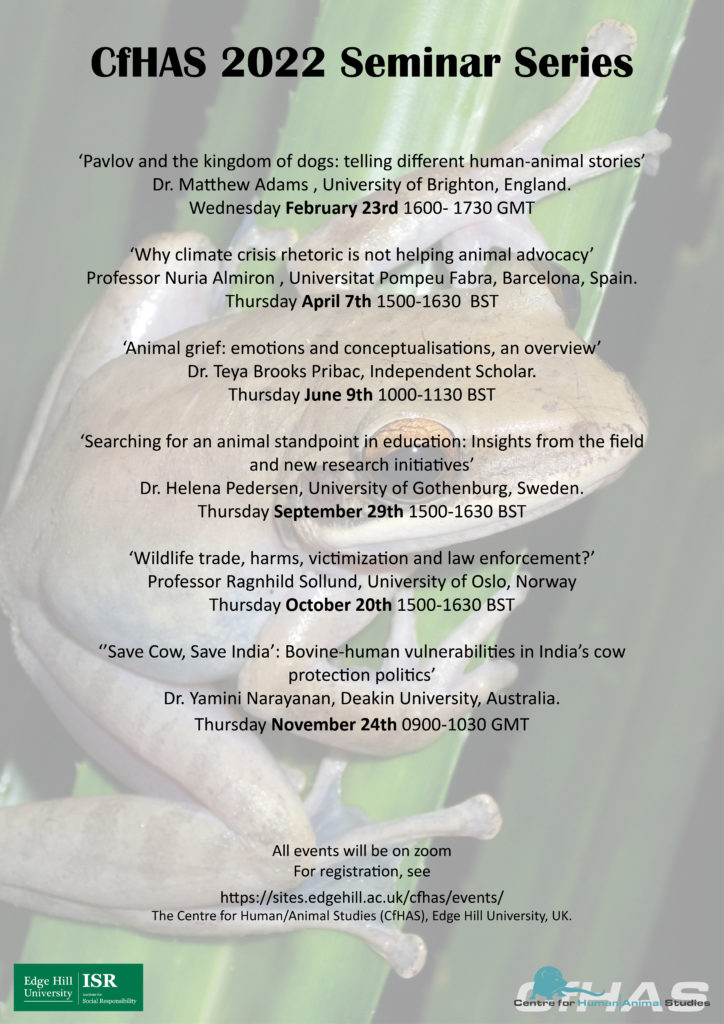
2021
On February 25th CfHAS Co-Director Richard Twine is a speaker at the following online symposium and book launch event – you can register for free here

In June 2021 CfHAS will host the biennial conference of the European Association for Critical Animal Studies (EACAS). This conference will be wholly virtual owing to the on-going pandemic and for reasons of sustainability. Abstract are due by end of February 2021 – for more info see here
2020
Call for Papers: Multispecies Heritage
Dates: 26 and 27 November 2020
Multispecies approaches have recently developed as important interdisciplinary connections between the arts and humanities and the natural sciences. The term ‘multispecies’ is used to characterise a varied set of critical perspectives that are connected in their commitment to non-anthropocentric ways of thinking. Multispecies studies consider communities of living beings, their shared histories and interrelationships in ways that bring ‘diverse bodies of knowledge into conversation … pushing them in new directions’ (Van Dooren et al, 2016: 2).
One of the imperatives of multispecies approaches is to interrogate and challenge anthropocentric approaches and emphasise interrelationships with other forms of life. In multispecies research, participants extend the understanding of value to include the perspectives of the more-than-human world. As an important shift away from the traditions that normalise human-centred thinking about ‘nature’ and ‘the natural world’, multispecies approaches can help to identify alternative ways of responding to questions about place, interspecies ethics, and land use.
This conference, organised by the Multispecies Storytelling network, asks how multispecies approaches can be used to understand more-than-human heritage and explore the epistemological, methodological and policy implications of such thinking.
We invite proposals from various disciplines including media studies, communication studies, cultural studies, geography, history, philosophy, literature, sociology, art, and anthropology. As well as ‘traditional’ papers, we welcome creative works that engage with the conference themes.
15-minute papers are invited on topics including but not limited to:
- Imagining multispecies heritage
- Multispecies heritage and landscape
- Multispecies heritage and place
- Ethics and multispecies heritage
- More-than-human landscapes
- Land use and more-than-human perspectives
- Multispecies methodologies and epistemologies
This event will take place online and will be free to attend. To be as inclusive as possible, the conference will take place across two days and the organisers intend to arrange presentations that take into account participants’ time zones.
Please submit abstracts of 250 words, a brief biographical note, institutional affiliation, and time zone by 23 September 2020 to:
[email protected] and [email protected]
‘Multispecies storytelling: more than human narrative about landscape’
Date: Friday 17 January 2020, 9.30am – 4.30pm
Location: Creative Edge building, CE225
Symposium: ‘Who speaks on behalf of nature?’
This symposium is the inaugural event of the UKRI AHRC funded network: ‘Multispecies storytelling: more than human narratives about landscape’. The event brings together a range of participants to consider who is enabled to speak on behalf of nature and which narratives are privileged or ignored as a consequence.
Invited speakers:
Professor Mara Miele (Cardiff University)
Dr Danielle Sands (Royal Holloway)
Dr Alex Lockwood (University of Sunderland)
Dr Robert McKay (University of Sheffield)
Dr Jos Smith (Nature Writing Archive, University of East Anglia)
Dr Alex Aisher (University of Sussex)
Network PI is Professor Claire Parkinson (Co-Director, Centre for Human Animal Studies). Network Co-I is Professor Brett Mills (University of East Anglia).
2019
The Beast & The Sovereign: Jacques Derrida and Other Animals
Date: Thursday 19 September 2019
Time: 10am-5pm
Location: Liverpool Quakers Meeting House, 22 School Lane, Liverpool L1 3BT
Registration: This event is free and open to the public – booking is essential. To book your space, please email [email protected]
In collaboration with the Institute for Creative Enterprise
At a time when sovereignty is a massively legible issue in the public realm and the prospects for planetary extinction are keenly debated, this one-day event responds to Jacques Derrida’s 2001-03 seminar series The Beast and the Sovereign. It will read the published seminar volumes, alongside the wider writing of Derrida, and the field of human-animal studies to ask how rethinking of our relations with animals can create meaningful social, policy, environmental, ethical and cultural change.
We will be joined by the following speakers during this one day event:
Prof Claire Parkinson (Edge Hill University)
Prof John Ó Maoilearca (Kingston University)
Prof Martin McQuillan (Edge Hill University)
Dr Zayneb Allak (Edge Hill University)
Prof Simon Morgan Wortham (Kingston University)
Prof Tom Cohen (SUNY, Albany)
Prof Nicholas Royle (University of Sussex)
Professor Claire Parkinson to give the opening keynote at the European Summer School in Human-Animal Studies at the University of Kassel in July 2019.
Professor Claire Parkinson delivered a keynote at the European Association for Critical Animal Studies (EACAS) Conference in May 2019 in Barcelona. Dr Richard Twine and Abi Masefield also presented, and Donelle Gadenne attended.
Dr Richard Twine gave two invited talks in Helsinki in January 2019. One, a public talk, entitled ‘Understanding the significance of Critical Animal Studies’ presented at the Oodi Library on January 16th 2019, the second, a talk to the Department of Gender Studies at the University of Helsinki, entitled ‘Anthropocene, Androcene, or ‘Anthropo’cene? From scientism to intersectionality’ on January 15th.
2018
Dr Richard Twine delivered keynote speech at the ‘In the Name of…International Conference on Animal Studies’, Jagiellonian University, Krakow, Poland, October 25/26, 2018.
- ‘This is not the Anthropocene – A Critical Animal Studies perspective on Climate Change’
Professor Claire Parkinson to deliver keynote speech at 2018 International Society for Anthrozoology (ISAZ) Conference, Sydney, Australia 2nd – 5th July 2018
- ‘Animals on screens: Thinking critically about animals, audiences and empathy’
Dr. Richard Twine is giving two talks in Gothenburg, Sweden in June 2018:
- ‘Where are the animals in the Sociology of Climate Change?’, to be presented at Gothenburg University, Sweden, June 13th 2018. 11am Room B3 335, Pedagogen building B.
- ‘The limitations of being ‘vegan for the animals’ ‘, to be presented at the Frilagret Cultural Centre, Gothenburg, Sweden, June 13th 2018. from 6pm
By invitation of the Gothenburg University Network for Critical Animal Studies.
Edge Hill University Festival of Ideas
Date: 18 May 2018
Challenging Climate Change, and the Animal-Industrial Complex: From Education to Empathy
2017
CfHAS Conference 2017 – Animals and Social Change
Date: 29 – 30 June 2017
Location: Liverpool, UK
CfHAS will host a conference on the theme of animals and social change in June 2017. We invite submissions that address these questions:
- What constitutes effective social change for other animals?
- How do particular framings of animal ethics and veganism shape strategies for intervention and change?
- How do the worlds of animal advocacy and academic research on human-animal relations speak to each other? Could more come from those interactions?
- What role do visual media, the online vegan community and documentary film-making play in effecting social change?
- How do different communities imagine progressive social change for animals taking place?
We are interested in receiving submissions of academic papers (20 minutes), short films (any genre) and poster presentations. This conference will include paper and poster presentations, film screenings and a workshop session focused on strategies for social change involving dialogue between academics, activists and advocates. The conference is designed to facilitate time and space for discussion.
This conference will be of interest to those working in critical animal studies, advocacy, grassroots activism, animal media and the vegan business community.
Please submit abstracts to: [email protected]
Closing date for abstracts: 1 March 2017
2014 – 2016
Film and the Environment
Date: 6 May 2016
Global climate change and environmental hazards are significant threats to the future of life on Earth. Recent scientific observations have shown the impact of anthropogenic activity on climate and highlighted the severity of projected changes on the environment. Effects will be felt through increases in weather extremes (storms, floods, landslides and droughts), compounded by the expansion of human populations into marginal ‘at risk’ areas.
This cross-disciplinary symposium focuses upon the intersection of film and environmentalism. Using the term ‘film’ in its broadest sense, to refer to moving image works that can be viewed via cinema, television or computer screens, we aim to foster knowledge exchange and generate dialogue between academics from the arts and humanities, philosophy, social and political sciences, and environmental sciences disciplines.
Centre for Human Animal Studies Inaugural Conference and Launch
Date: 25 October 2014
Reflecting the expansion and intellectual vibrancy in the fields of animal studies, Critical Animal Studies, human-animal studies, and the science of animal emotion and cognition, this conference will have three broad but intersecting thematic strands: ethics, sustainability and sentience.
Pre-Conference Events
Date: 24 October 2014
Book launch: Growl: Life Lessons, Hard Truths, and Bold Strategies from an Animal Advocate. Includes a reading and Q&A with the author, Kim Stallwood. And Pre-Conference Dinner.
II International Conference Art and Nature
Dates: 28-30 April 2014
Sao Paulo, Brazil
BSA Animal/Human Studies Group Roundtable
Date: 23 April 2014
University of Leeds
The Science of Animal Thinking and Emotion Conference | 17-18 March 2014
The Kellogg Conference Center at Gallaudet Univ. 800 Florida Avenue, NE Washington, District of Columbia 20002 United States
Green Party Conference | 1 March 2014
Transcript of talk by Professor Claire Molloy given at the Green Party Conference, 1 March 2014. Hosted by the Vegan Society, this talk was given as part of the ‘Policy for health, social justice and sustainability Conference Fringe debate. The talk was transcribed by the Vegan Society and can be downloaded as a pdf here:
